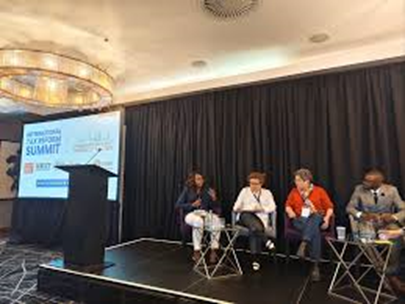International Tax Reform Summit: Johannesburg: 27 May 2025
- May 27, 2025
- 3 min read

The Chief Executive Officer of the Inclusive Society Institute, Daryl Swanepoel, participated in the International Tax Reform Summit which was held in Johannesburg on 27 May 2025. The summit was organised by the Alternative Information and Development Centre, the Institute for Economic Justice, Oxfam, the Friedrich Ebert Stiftung and the Independent Commission for the Reform of International Corporate Taxation.
The programme included four sessions:
Session 1: International Tax Reform: Opportunities and Challenges for Africa in the context of the G20
Session 2: Towards a Shared Progressive Tax Agenda for Africa at the UN
Session 3: Taxing the Super-Rich to Finance SDGs, Climate Action, and Addressing Inequality
Session 4: Joint Advocacy strategy discussion with comms teams
-------------------------------------------------------------------------
Background as provided by the Summit organisers
There are fundamental shifts in the international political economy. As the world grapples with climate change, poverty, and inequality, there is an opportunity to tackle these challenges by reforming the international tax system.
Negotiations for a United Nations Framework Convention on International Tax and Cooperation (UN Tax Convention) are ongoing and at the same time, South Africa has taken up the G20 presidency in 2025 - a first for an African country, which provides a great opportunity for South Africa to advance developing countries' proposals in international tax negotiations.
The SARS commissioner highlighted that the country has a tax gap of R700 - R800 billion, of which R300 - R560 billion is due to tax evasion, aggressive tax planning, and the rest is in uncollected debt and outstanding tax returns and debt currently under dispute. This is not limited to South Africa. It is estimated that in 2024, global revenue losses due to cross-border abuse amounted to $492 billion, of which $347.6 billion was due to corporate tax abuse by Multinational Enterprises (MNEs), and $144.8 billion was due to undeclared assets by wealthy individuals. There are increasing calls to capacitate the South African Revenue Services (SARS) to address tax abuse and illicit financial flows (IFFs) and introduce a wealth tax.
Africa faces a disproportionate burden of these harmful tax practices. For instance, from 1980 to 2018, Africa lost $1.3 trillion due to illicit financial flows and $88.6 billion annually due to capital flight. Therefore, SA’s G20 presidency should ensure that the international tax system effectively tackles IFFs and capital flight, and taxes the wealthy to advance Sustainable Development Goals (SDGs).
The G20 under the Brazilian presidency championed an initiative for taxing high-net-worth individuals (HNWIs) globally with a minimum tax of 2% of their wealth, which would enhance progressivity in tax systems across the world while mobilizing between $200–$390 billion annually. Brazil managed to include language on taxing HNWIs both in the Ministerial G20 Declaration on International Taxation and on the G20 Head of States Declaration, marking a historic milestone for the group of 20 that addressed this issue for the first time. South Africa
has a unique opportunity to provide full political support to this agenda during its presidency, playing a coordinating role by outlining a strategy to ensure the continuity of Brazil’s agenda.
The SA G20 Presidency provides an opportunity for South African key stakeholders to develop a coherent response advocating for the G20 - SA Presidency to make progress from the steps taken in Brazil. This is even more relevant considering the recent call from President Ramaphosa, alongside President Sanchez (Spain) and President Lula (Brazil), to protect and reinforce multilateralism, having the taxation of global wealth as a key component of this initiative.
Against this context, it is important for progressive civil society actors such as trade unions, civil society organisations, academic experts, parliamentarians, think tanks, and policymakers to discuss these developments and build a long-term strategy on international tax that takes into account domestic and international developments. Noting that SA is one of the high-ranking unequal societies in the world, it is important to reflect on the contemporary tax reforms and consider their gendered impacts.
The symposium will focus on international tax reform efforts such as the UN Tax Convention and the proposal to tax the super-rich led by Brazil’s G20 presidency.








LAPAKBET777LOGIN
ALTERNATIFLAPAKBET
LAPAKBET777DAFTAR
LAPAKBET777OFFICIALL
LAPAKBET777RESMI
Managing cross-border taxes can be complex. I found GTA’s International Tax expertise really helpful for staying compliant.
Our international tax scenario was complex—thankfully, their International Tax consultants knew exactly what to do.